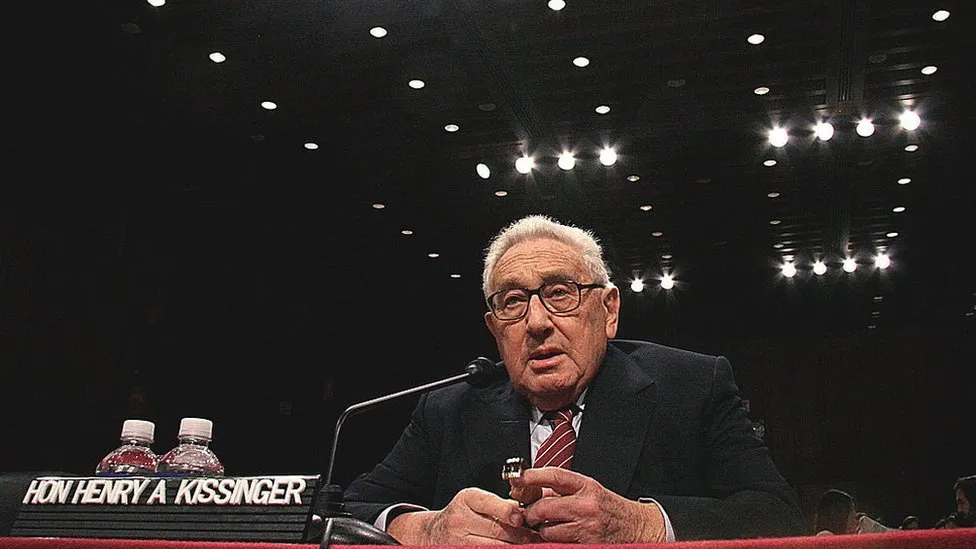
Henry Alfred Kissinger, soldier, scholar, celebrated diplomat, geopolitical consultant, died on Wednesday, 29th November 2023. He was one hundred years old, having been born on 27th May 1923.
Educated at Harvard University, after serving in the United States Army during World War II, Kissinger was an admirer of the Austrian statesman and diplomat, Klemens von Metternich. This is evidenced by his published PhD dissertation entitled:A WORLD RESTORED:METTERNICH, CASTLEREAGH AND THE PROBLEMS OF PEACE, 1812-22.

Until his appointment as National Security Advisor and Secretary of State under the administrations of Presidents Richard Nixon and Gerald Ford, Kissinger was an adviser and consultant to American government agencies, think tanks and the Nelson Rockefeller and Richard Nixon presidential campaigns.
Kissinger built a shimmering diplomatic career on the foundation laid by his forebears. Fondly referred to as THE WISE MEN, and celebrated in a book of the same title by Walter Isaacson and Evan Thomas, they are: Dean Acheson, Secretary of State under President Harry S. Truman; Charles E. Bohlen, U.S. Ambassador to the Soviet Union, the Philippines and France; W. Averell Harriman, Special Envoy for President Franklin Roosevelt; George F. Kennan, Ambassador to the Soviet Union and Yugoslavia and State Department Director of Policy Planning; Robert A. Lovett, Secretary of Defense under President Truman; and John J. McCloy, War Department Officer and later U.S High Commissioner for Germany.
The aforementioned technocrats were credited with shaping the containment policy during the Cold War and putting in place institutions and initiatives such as the North Atlantic Treaty Organization(NATO), the World Bank and the Marshal Plan.
George F. Kennan, was particularly noted for advocating “containment” of the Soviet Union. In his famous LONG TELEGRAM of 1946, Kennan argued that the defunct Soviet Union was expansionist and that its influence had to be circumscribed or “contained”. He sustained this thesis in his 1947 article, THE SOURCES OF SOVIET CONDUCT.
Under his watch as National Security Adviser and Secretary of State, Henry Kissinger was able to accomplish the following:1) embark on “Shuttle Diplomacy” in the Middle East to end the Yom Kippur War of fifty years ago; 2) he negotiated the PARIS ACCORDS, which ended American involvement in the Vietnam war;3) he promoted the policy of DETENTE or easing of strained relations with the Soviet Union which facilitated nuclear talks and disarmament;4) he masterminded an opening of relations between America and China, beginning with a secret visit to China in 1971.
Kissinger’s landmark accomplishments on the diplomatic front were such that a 2014 poll of American International Relations scholars conducted by the College of William and Mary ranked him as the most effective Secretary of State in the fifty years prior to 2012.
If Kissinger is viewed as being the most effective Secretary of State, he is viewed as probably the most controversial. Not a few critics see him dimly as a war criminal on account of his alleged genocidal propensities. Kissinger is being accused of the following:1) the bombing of Cambodia;2) involvement in the 1973 Chilean coup d’etat;3) support for the Argentinian military junta during the regime of Augusto Pinochet Ugarte and the prosecution of his Dirty War;4) support for Indonesia in its invasion of East Timor;5) support for Pakistan during the Bangladesh Liberation War and Bangladesh genocide; and 6) the hounding of liberation movements and progressive governments in Africa.
Even after leaving office and establishing his firm, KISSINGER AND ASSOCIATES, Kissinger is thought to have endorsed President Ronald Reagan’s repugnant policy on Apartheid. Kissinger graced the policy speech in which Reagan encouraged the Apartheid regime in South Africa to remain entrenched in its laager.
Though Kissinger appeared the only pillar and stalwart of the Nixon administration left standing after its buffeting by the Watergate scandal, a number of observers credit Kissinger for surviving intact, not because of his integrity but on account of his savvy. David Halberstam made a note of Kissinger’s alleged slyness in his book, THE POWERS THAT BE. In 1972, the influential TIME magazine, which had excerpted two of Kissinger’s books, namely, WHITE HOUSE YEARS and YEARS OF UPHEAVAL, remarked of Kissinger:”a streak of suspicion seems to underlie all that he does”.
In spite of the reservations notable journalists harbored about Kissinger, he was thought to have defended American and Western interests to the hilt. Kissinger and other notable immigrants who fled oppression/persecution from Germany and Russia are thought to have added tremendous value to Western ideals and strength. Isaiah Berlin(who came to Britain from Russia), Albert Einstein, Eugene Isaac Meyer, Max Frankel etc added verve to the liberal idea and paved the way for the consolidation of American power and dominance.
To cement his place as a scholar and an unsurpassed pundit on diplomacy, Kissinger’s last two major books were:ON CHINA(2011) and WORLD ORDER(2014). It is a measure of Kissinger’s standing that the state-owned Global Times of China remarked on his passing in an editorial:”May there be successors to Henry Kissinger in the US”. In a personal telegram to his widow, Nancy, the Russian leader, Vladimir Putin, said Kissinger was a “wise and far sighted statesman”.
Former British Prime Minister, Tony Blair, commented:”The range of his knowledge, the insights which would tumble out of him effortlessly, the lucidity, the mastery of the English language which made him a joy to listen to on any subject…leading to an answer and not just an analysis: no one could do that like Henry. If it is possible for diplomacy, at its highest level, to be a form of art, Henry was an artist”.
